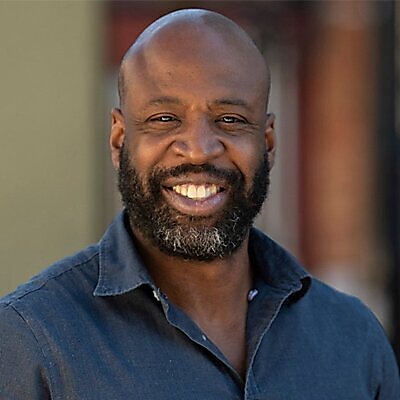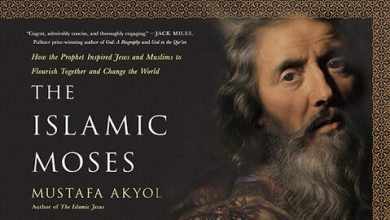Cato’s Erec Smith: ‘I’ve Been Accused of White Supremacy Because I Value Things like Self-Reliance and Individualism’

Cato Editors
Erec Smith, a Visiting Scholar of Politics and Society at the Cato Institute, is the co‐founder of FreeBlackThought.com and the author of A Critique of Anti‐Racism in Rhetoric and Composition: The Semblance of Empowerment. In a September 19 interview on CSPAN’s Booknotes+, Smith discussed his work and commented on several controversial topics, including racism and DEI, diversity, equity, inclusion. Below are excerpts from the interview.
Asked about his favorite writers as a young man, Smith said, “Ralph Waldo Emerson and Frederick Douglass were my favorites [of the 19th century]. … Emerson’s self‐reliance was a big motivator when I was in college as an undergrad. It resonated with me. … He has a wonderful essay titled ‘Self‐Reliance,’ and he goes through life saying here’s why we shouldn’t have to depend on others too much. … We have knowledge ourselves. We should live life, you know, get out of the library and go out and live life. … I liked his grit, I liked his moxy, and I like what he was saying about self‐reliance. Unfortunately, I think it’s something that is starting to wane in society today.”
Frederick Douglass is “an amazing story,” Smith said. “An escaped slave who became the most famous speaker of the 19th century. I could put ‘arguably’ in front of that, but no. If you look at the speaking engagements he had, the newspaper articles, he was in demand. People wanted to hear how this black slave escaped and became so eloquent.
“Well, he did it because of self‐reliance. Hard work, knowing what he wanted to do, and going for it. Being pragmatic. And he admired Emerson for that. … They were inspirations for how to go out in this world and succeed. If Frederick Douglass can escape slavery and become the person he was, there’s no excuse for me not achieving my goals. What’s more, self‐reliance is one of my favorite attributes, along with individuality – two things that Emerson embodied.”
Explaining his co‐founding of FreeBlackThought.com, Smith said, “Free Black Thought is a non‐profit focused on displaying viewpoint diversity within black America. There’s this idea that black people think alike, that they agree on certain interpretations, they agree on certain goals, things like that. They share the exact same values, attitudes, beliefs – and that is not true. So, Free Black Thought is out there to dispel that myth, and provide a voice for black writers, and poets and artists, who aren’t represented in mainstream media.”
After criticizing a speech by an academic who argued that learning standard English was wrong, Smith said he got a lot of pushback, people writing that he was “not a real, authentic black person, that I had a colonized mind, and I wasn’t as enlightened as everybody else about race relations in America and things like that. It got pretty vicious. It spilled over into social media. That motivated me to focus on the rhetoric of anti‐racism and to fight race‐essentialism, and to carve out free black thought.”
Smith: “There are certain people out there who don’t agree with me. It’s interesting when white people tell me I’m not being black correctly. That’s always fun. … I’ve been accused of white supremacy because I value things like self‐reliance and individualism. I value learning as many dialects as you can, especially the one that’s the most common certainly in the professional spaces. Because of that I am [described] in quote/unquote the white ways of knowing, and therefore a danger to the black community. And when white people tell me that it’s really disquieting, and infuriating, if I’m to be honest.”
When asked what he says back to those critics, Smith said, “It hasn’t really happened to my face. It’s happened on social media. I’m not entirely sure it would happen to my face anytime soon. But I remind people of the hypocrisy coming from a lot of anti‐racist scholars, activists, what have you, who insist that we believe black voices – but not mine. They insist we should embrace the lived experiences of black people – but not mine. So I point out that hypocrisy and they typically have nothing to say.”
Smith was then asked to define certain phrases from his book.
Smith: “Systemic racism is the idea that racism, they say, is baked‐in to American society and to American institutions. The idea is that these institutions are built with the oppression of minorities in mind. Certain policies are made so that white people maintain superiority. And every disparity in race relations is because of this systemic racism. Right? Every problem is because of this systemic racism and nothing else. That’s the idea.”
Asked if he sees systemic racism actually happening, Smith replied, “I don’t typically see it actually happening. But that’s the nature of it, if you ask the people who believe in it. It’s supposed to be hidden, insidious. It’s something you have to look for. And if you don’t see it, then you are suffering from false consciousness. You have a quote/unquote colonized mind….”
Asked what white supremacy means to him, Smith said, “White supremacy is the act of maintaining supremacy by people of European ancestry. It is aligned with Enlightenment values like self‐reliance and individualism, primacy of reason, rule of law. All these things are derived from people who derived from Europe, a.k.a. white people, and therefore, because of that connection, they are already considered inherently racist. A lot of people go so far as to say these things are worsening racism because they help hide it.”
Smith was then asked if he believes there is white supremacy and he said, “No. [People] who are most adamant about white supremacy are the ones that tend to have the least interaction with white people. They tend to be people who grew up in predominantly black and predominantly Latino areas and didn’t really meet and interact with white people until later on in their lives.
“I grew up in a predominantly white area and went to a very diverse school with many white people and black people around me. I liked it, I was proud of it for that. … At a young age I realized that white supremacy was not really legitimate. I was sitting in class and I looked to my left, and the white kid to my left was eating paste and I said, ‘He’s superior to me?’ (Laughter.) This is clearly a myth. … White supremacy is not the bogeyman, the specter that some people say it is.”
As for Black Lives Matter, Smith said, “I love the term. But the organization has some flaws, as most people are starting to realize. Forget about the financial issues they’re in. They’re coming from a particular ideology that I think is not conducive to improving race relations. That ideology is based in Marxist thought. They call it critical theory, or critical social theory. It basically — it takes Marx and instead of proletariat bourgeoisie, it’s [garbled] and project that on society and move from there. It’s based on that idea and I think it’s profoundly flawed.
“… A lot of black people feel like me. They don’t speak up because it doesn’t seem to be in their best interests. They like their jobs. They like being part of a community, whatever, and they don’t want to rock the boat. They understand the flaws in the logic of organizations like BLM.”
Commenting on DEI, diversity, equity, inclusion, Smith said, “The terms came from the civil rights movement in the 60s. … However, the definitions we have now are derived from a critical social justice mindset, and those terms have changed. … [Today] diversity means diversity of bodies but not viewpoint. … Equity means equality of outcome not equality of opportunity. … And inclusion is basically tantamount to censorship. You can’t say anything that might offend a minority or — they call it micro‐aggressions. If you ask someone where he or she is from, that is considered inherently racist, whether consciously or unconsciously. So, these things are not quite what they used to be.
“That makes all the difference because that leads into the redefinition of other terms, like racism, for example. That can only be a white person discriminating against a black person, regardless of the white person’s socio‐economic status or a black person’s socio‐economic status. … Racism can only be done by white people. If I am discriminatory against people because of their white skin, that’s just discrimination, that’s just prejudice. Racism is something different.
“Most Americans don’t know that. Yet their DEI officials in their workplace or their school, or something like that, are abiding by those definitions, which is part of the reason why they can get away with it.”
To listen to the interview, click here.





